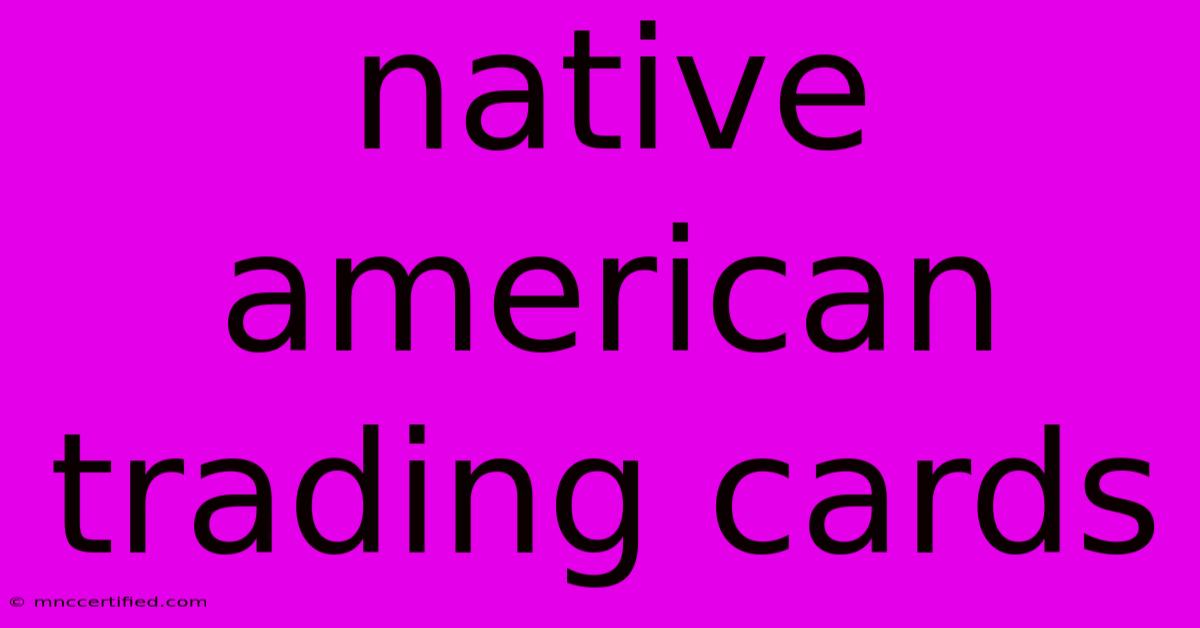Native American Trading Cards

Table of Contents
Native American Trading Cards: A Collector's Guide and Cultural Sensitivity
Native American trading cards represent a complex and often controversial area of collecting. While they can offer a fascinating glimpse into history and diverse cultures, it's crucial to approach them with sensitivity and awareness of their potential to perpetuate harmful stereotypes. This guide explores the history, different types, and ethical considerations surrounding these collectibles.
The History of Native American Trading Cards
The production of Native American trading cards spans several eras, each reflecting the prevailing societal attitudes towards Indigenous peoples. Early cards, often dating back to the late 19th and early 20th centuries, frequently presented highly stereotypical and romanticized depictions. These images often portrayed Native Americans as savage warriors or noble savages, perpetuating harmful myths and ignoring the richness and diversity of individual tribal cultures.
Early 20th Century Cards: Stereotypes and Misrepresentations
Many of these early cards, produced by companies like Buffalo Bill's Wild West show cards, were part of larger marketing campaigns often linked to dime museums or Wild West shows. They capitalized on the popular fascination with "the Wild West," frequently presenting inaccurate and demeaning portrayals of Indigenous peoples. These cards rarely included accurate information about the depicted tribes or individuals, further contributing to the misrepresentation.
Mid-20th Century and Beyond: Shifting Representations
Later iterations of Native American trading cards have attempted to provide more accurate and respectful portrayals. However, even modern cards can fall short, depending on their source and the intention behind their creation. Some modern sets aim for educational value, featuring accurate information about various tribes and their cultures.
Types of Native American Trading Cards
Several types of cards exist within this collecting niche:
- Non-Sports Cards: These are the most common type, often featuring images of Native Americans alongside brief biographical information (often inaccurate or incomplete). These frequently come from cigarette cards, candy wrappers, and other promotional materials.
- Sports Cards: While less common, some athletes of Native American descent are featured in mainstream sports cards. These often present a more contemporary and accurate perspective.
- Contemporary Artist Cards: These cards might showcase artwork by Native American artists, offering a more authentic and nuanced representation of their cultures.
Ethical Considerations in Collecting Native American Trading Cards
Collecting Native American trading cards demands careful consideration of ethical implications. It's crucial to:
- Acknowledge the Historical Context: Understand the historical biases and stereotypes present in many older cards.
- Research the Creators and Publishers: Investigating the background of the card's producer can illuminate the context and potential biases.
- Support Native American Artists and Communities: Prefer cards that feature contemporary Native American art or directly support Indigenous communities.
- Avoid Perpetuating Harmful Stereotypes: Be mindful of the potential to unintentionally reinforce negative stereotypes through your collecting practices.
- Respect Cultural Heritage: Remember that these cards represent real people and cultures, deserving of respect and accurate representation.
Building a Responsible Collection
Building a collection of Native American trading cards responsibly means prioritizing education and ethical considerations. Focusing on cards produced by Native American artists or those with demonstrably accurate and respectful portrayals is paramount. Always research the background of your cards and seek out information from reputable sources, including tribal museums and historical societies.
Keywords for SEO
- Native American trading cards
- Native American collectible cards
- Indigenous trading cards
- American Indian trading cards
- Tribal trading cards
- Cigarette cards Native American
- Buffalo Bill's Wild West trading cards
- Ethical collecting
- Cultural sensitivity
- Stereotypes in trading cards
- Native American representation
- Contemporary Native American art
- History of Native American trading cards
This article provides a solid foundation for a blog post about Native American trading cards. Remember to optimize the images used with alt text including relevant keywords. Furthermore, promoting the article through social media and relevant online communities (with respect and sensitivity) will improve its off-page SEO. Always be mindful of the delicate balance between collecting and cultural sensitivity.

Thank you for visiting our website wich cover about Native American Trading Cards. We hope the information provided has been useful to you. Feel free to contact us if you have any questions or need further assistance. See you next time and dont miss to bookmark.
Featured Posts
-
Dakota Territory Trading Post
Nov 29, 2024
-
Acceptance Insurance Ocala Fl
Nov 29, 2024
-
Tmj Explained Zoe Balls Experience
Nov 29, 2024
-
Top 50 Black Friday Deals Under 100
Nov 29, 2024
-
Cks Prime Investments Website
Nov 29, 2024